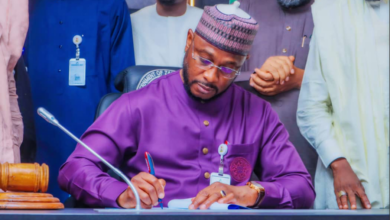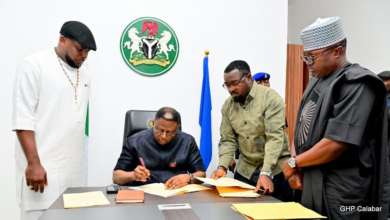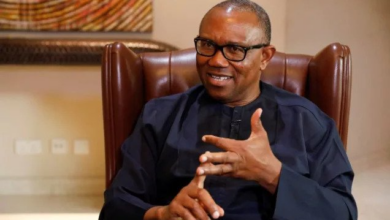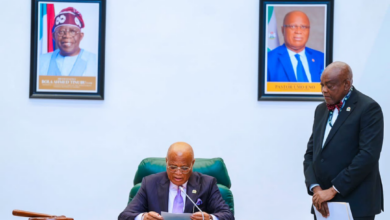Tinubu Vows To End Nigeria’s Overreliance On Borrowing For Public Expenditure
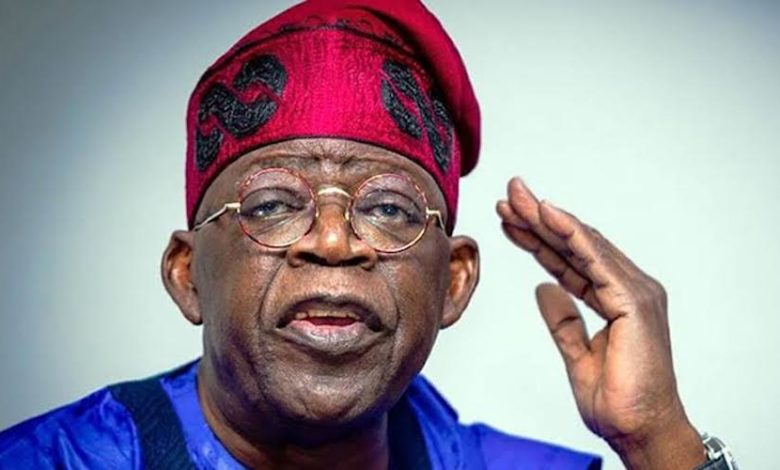
•Sets 18% tax-to-GDP target by 2026
•Nation’s revenue generation falls below African standards, says Oyedele
•Reveals Nigeria loses N20tn annually to tax system gaps
•Pledges committee”ll get rid of multiple taxation
President Bola Tinubu has pledged his readiness to break the vicious cycle of overreliance on borrowing for public spending, and the resulting burden of debt servicing it places on the management of Nigeria’s limited revenues.
Tinubu spoke yesterday at State House, Abuja, while inaugurating the Presidential Committee on Fiscal Policy and Tax Reforms. He mandated the committee to improve the country’s revenue profile and business environment, as the federal government moved to achieve 18% tax-to-Gross Domestic Product (GDP) ratio target within three years.
Tinubu directed the committee headed by renowned tax expert, Mr. Taiwo Oyedele, to do all within its powers to achieve its one-year mandate, which was divided into three main areas: fiscal governance, tax reforms, and growth facilitation.
He also directed all government ministries and departments to cooperate fully with the committee towards achieving its mandate.
The president told the committee members the significance of their assignment, saying his administration carries the burden of expectations from citizens who want their government to make their lives better.
According to him, ”We cannot blame the people for expecting much from us. To whom much is given, much is expected.
“It is even more so when we campaigned on a promise of a better country anchored on our Renewed Hope Agenda. I have committed myself to use every minute I spend in this office to work to improve the quality of life of our people.”
Acknowledging Nigeria’s current poor standing in the tax sector, Tinubu said the country still faced challenges in areas, such as ease of tax payment and Tax-to-GDP ratio, which lagged behind Africa’s continental average.
He stated, “Our aim is to transform the tax system to support sustainable development while achieving a minimum of 18% tax-to-GDP ratio within the next three years.
“Without revenue, government cannot provide adequate social services to the people it is entrusted to serve.
“The committee, in the first instance, is expected to deliver a schedule of quick reforms that can be implemented within 30 days. Critical reform measures should be recommended within six months, and full implementation will take place within one calendar year.”
Earlier, Special Adviser to the President on Revenue, Mr Zacchaeus Adedeji, while recalling the president’s sterling track record on revenue transformation, described the committee members, drawn from the public and private sectors, as accomplished individuals.
“Mr. President, you have the pedigree when it comes to revenue transformation,” Adedeji said. He added, “You demonstrated this when you were the governor of Lagos State over 20 years ago.”
Speaking at the occasion, also, the chairman of the committee, Oyedele, noted that Nigeria’s revenue generation was below the African standard, even though the country’s collection costs were among the highest.
He pledged that members of the committee were committed to giving their best in the interest of the country.
According to Oyedele, “Many of our existing laws are outdated, hence, they require comprehensive updates to achieve full harmonisation to address the multiplicity of taxes, and to remove the burden on the poor and vulnerable, while addressing the concerns of all investors, big and small.
“Our tax administration has improved but remains relatively basic, with instances of unregulated collections by untrained officers, particularly at the local government level, being widespread.
“Our revenue generation falls below even African standards, yet our collection costs are among the highest. This is due not only to multiple taxes but also numerous collection agencies and fragmented revenue reporting procedures.
“Public willingness to pay taxes is strained because of a lack of trust in government, both among individuals and businesses, irrespective of size. The burden of tax falls heavily on those who comply, while those who evade often get away with little or no consequences. We need to change this.
“The process of resolving tax disputes is protracted and costly, with inadequate mechanisms for many small businesses and vulnerable individuals to seek fair tax resolution, as professional services are often beyond their means.”
Speaking with newsmen after the inauguration of the tax reform committee, Oyedele disclosed that Nigeria lost about N20 trillion annually to gaps existing within its tax system, including evasion and certain inefficiencies in collection modes. He spoke in the company of Adedeji; World Bank Country Director in Nigeria, Shubham Chaudhuri; and President of Manufacturers Association of Nigeria (MAN), Francis Meshioye.
Oyedele lamented that those who evaded tax got away with little or no consequences, stressing that this needs to change.
He said data had shown that Nigerians were willing to pay taxes if they saw what the monies translated to.
Oyedele also disclosed that the task of the committee was to get rid of multiplicity of taxes that had impeded the prosperity of Nigerians, saying this would be achieved by harmonising taxes and providing the country with fewer number of taxes.
He stated that the mandate of the committee “is to get rid of so many taxes that come in the way of prosperity for our people. So Nigerians should look forward to a more harmonised, fewer number of taxes.
“But then it seems like it’s a contradiction. How do you then raise the revenue? Now, we know where we’re going to get the revenue from – there’s a huge tax-gap. What that means is as of today, without introducing any new taxes, if you get everyone that needs to pay their taxes to pay, we will not be where we are. So we think that the gap is somewhere in the region of N20 trillion.
“In addition to that, you would also imagine that we have inefficiencies in the way we collect the little that we collect. And that inefficiency is coming from, you know, sometimes, I think in the 2023 budget, we have like 63 MDAs that were given revenue targets.
“Those MDAs want to be able to focus on their primary duties of why they were established, the revenue mandate is a distraction for them.
“So imagine that we asked the FIRS to collect those revenues on their behalf so those agencies, by focusing on their primary mandates, they’ll facilitate the economic development we’re looking for.
“FIRS will collect the revenues efficiently, which means not only is the top line growing because the cost of collecting it is reducing. And that gives you a much bigger margin to take care of the people.
“So these are some of the areas where we expect that the increase (18% tax-to-GDP) would come from. If we get to a point where it becomes necessary to look at existing tax rates, and all of that, it will be maybe as a result of harmonisation of taxes that we have repealed from the current legislation.”
Shedding more light on the targets, Oyedele said, “We don’t want to tax investment because it seems counter-intuitive. If you need more investment for economy to grow, why do you make it more expensive to invest? Why don’t I allow you invest and when you’re making the returns on your investment, we can talk about the taxes at that point?
“Why am I taxiing production when I need more productions to even create the employment for our people, when I can wait for you to produce and tax the consumption?
“How do I ensure that while I’m taxing consumption, it does not come in the way of the quality of life and so on and so forth? And that’s where the policy design comes in. So in designing your policy and part of the mandates of this committee is to get a lot of data about our people.
“So when we are collecting data about our people, it is not because we want to tax everyone. When you have that data, you use it to design the fiscal policy such that the poor and vulnerable do not carry the burden of tax. So that’s why you see – and we have a bit of that already – you see basic food item is exempted from VAT, right? So that’s the plan.
“The plan is to ensure that there are some of us who can afford those things. Some of us will go to a five star hotel today and have lunch and that is N25, 000. For some people, that is their monthly income. So the person that can pay 20,000, 25,000 to buy a meal, they can afford a little bit more to take care of society as a way of a contributing to our economy”.
Speaking also, Chaudhuri said Nigeria needed to significantly increase its tax-to-GDP ratio. He lauded Tinubu for eliminating fuel subsidy, which he said added close to two percentage points of GDP to government revenues.
He emphasised that for government to provide basic services, such as healthcare, education, and infrastructure, it typically needed to spend between 15 per cent and 20 per cent of GDP. “However, Nigeria has been spending only 10 to 12 per cent of GDP, while its revenues have been about seven to eight per cent of GDP,” Chaudhuri. He added, “Therefore, there is a large deficit that needs to be addressed. Improving the tax administration and reducing the tax gap are crucial steps to narrowing this deficit.”
The World Bank country representative said to raise revenues, Nigeria must address several areas.
He said the elimination of fuel subsidy was a significant step in the right direction.
According to him, a key concern is the low number of personal income taxpayers compared to the number of individuals earning significant income in Nigeria.
He added that the country needed to examine tax expenditure and assess whether collection costs were excessive.
Chaudhuri stated, “Harmonisation and fine-tuning of the tax policy regime may also be necessary, with certain taxes being increased while others are eliminated. Ultimately, the biggest gains will come from improving tax administration and reducing the tax gap.”
Another important aspect to consider was the quality of government spending, Chaudhuri said. He stated that redirecting funds to areas that Nigeria truly needed and ensuring that they were not spent in the wrong places could help bridge the gap between revenues and necessary expenditure.
He said the focus should be on investing in areas, such as human capital development and youth skills, as articulated by Tinubu.
Chaudhuri said he believed that Nigeria should strive to achieve a target tax-to-GDP ratio of 18 per cent over time, which would align with other middle-income countries, like India and Indonesia.
On his part, MAN President, Meshioye, emphasised the significance of the committee’s inauguration, stating that it represents a landmark step for the country.
He emphasised the importance of levying fair taxes and ensuring that they were deployed appropriately to enhance the business environment.
Meshioye said there should be a strong link between the government’s fiscal policy, taxation, and the well-being of the people.
He emphasised that businesses should not refrain from paying tax, but instead focus on the fair assessment of taxes.
The MAN boss expressed optimism about the president’s address.
He said it instilled hope in Nigerians that taxes would be fairly charged and that the revenue generated would be invested in enhancing the business environment, fostering competitiveness, and attracting foreign investments.
According to him, “One thing that is of importance is that there’s a realisation that there has to be a link between the government’s fiscal policy and taxation and the well-being of the people.
“Our businesses have no business refraining from paying tax, the only issue that we’ve had has always been ensuring that a fare tax is paid and that the income tax is used by the government to improve business environment and the wellbeing of the people.
“The address that Mr. President gave today has significantly raised the hope of Nigerians that taxes will be fairly taxed and that it will be deployed to improve business environment, make us more competitive and make us more attractive to foreign investment. The composition of the committee has given a wide range of opportunity for all Nigerians – business interest, government interest to be able to work together in a sustainable manner.”
Source: www.thisdaylive.com


